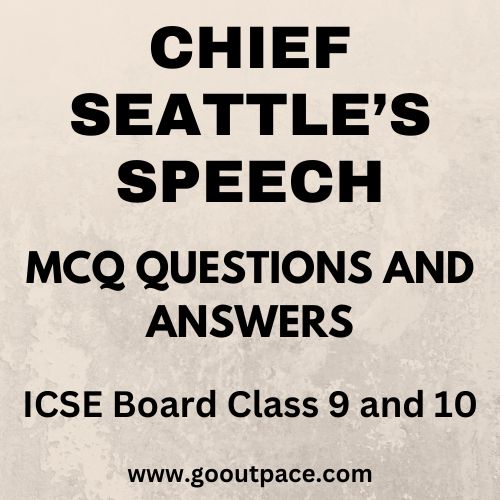You will go through MCQ Questions And Answers Of ICSE Board Class 9 and 10 CHIEF SEATTLE’S SPEECH. Understanding a text’s entirety is very important for a learner to score better on the exam. We made Efforts to ensure thorough and proper MCQ Questions And Answers Of ICSEBoard Class 9 and 10 CHIEF SEATTLE’S SPEECH.

1. When was the speech delivered?
- 1876
- 1854
- 1870
- 1754
2. Who was Chief Seattle?
- A political leader from Seattle
- A writer and novelist
- A Suquamish and Duwamish chief
- An activist
3. “My words are like the stars that never change”- What does this line mean?
- The words are as bright as stars in the night sky
- The words are as constant as the stars in the sky
- The words are to be believed and not doubted
- The words are temporary and make no sense
4. Who is referred as the ‘White Chief’ in the speech?
- Governor of Washington
- President of America
- Prime Minister of the UK
- Governor of California
5. Who is referred as the ‘Great Chief’ in the speech?
- Chief Minister of the UK
- President of USA
- Chief of the tribal group
- President of America
6. “My people are few”- Who is the “people” in this context?
- The white community
- The indigenous people
- Chief Seattle’s family members
- Chief Seattle’s friends
7. Who are the ancient enemies far to the northward?
- the Haidas and Tsimshains
- The white community
- Other tribal communities
- Rough climate
8. How did the Chief describe the people of the European settlers?
- The Chief mentioned how helpful they have been
- The Chief has expressed his hatred towards them
- Grass that covers vast prairies
- Scattering trees of a storm-swept plain
9. Which of the following tone can you NOT find when you read the speech?
- Passive Aggressive
- Dignified
- Calm
- Happy
10. Why will the White men never be alone again?
- They were very religious
- They would be surrounded by the stories and memories of the tribal communities
- They would be forever haunted by their bad deeds
- They would keep colonising other communities
11. What did the Big Chief offer to give if the communities agreed to the land settlement?
- Providing protection to the native warriors
- Offering sufficient amount of land for them to live peacefully
- Providing protection to the women, children and the old men of the natives from the attacks of their enemies
- Offering lots of gold and wealth
12. “There is little in common between us”- Who is the speaker?
- White Chief
- An unidentified speaker
- Chief Seattle
- Big Chief
13. What does the Chief think about the settlers’ offer?
- The Chief thinks the offer would not work in the future
- The Chief is confirmed that this settlement and offer would work
- The Chief was angry about this offer
- He was upset and heartbroken about leaving their own land
14. “Day and night cannot dwell together.”- Identify the figure of speech.
- Oxymoron
- Metaphor
- Metonymy
- Pun
15. Who is the speaker in the prose?
- Chief Seattle
- White Chief
- Big Chief
- An unidentified speaker
16. “Day and night cannot dwell together.”- Who is the Chief referring to as ‘night’?
- European settlers
- Black women
- African Americans
- Tribal people
17. Which two races have been talked about in the story?
- European settlers and African Americans
- African Americans and tribal people
- Tribal communities and European settlers
- Asians and European settlers
18. According to the Chief, who would never be alone in the future?
- The White settlers
- The tribal community
- Chief Seattle’s family
- Women and children
19. Who was the Governor of Washinton when Chief Seattle gave this speech?
- Watson C. Squire
- Alvan Flanders
- Richard D. Gholson
- Isaac Stevens
20. What did the White Chief want from the tribes?
- The tribes were asked to agree to a land settlement where they would have to surrender their land
- The tribes were handed over all the land rights
- He wanted to have a friendly settlement with the tribal community
- He wanted to gain total access to the wealth and power of the tribal communities
Answers:
- B) 1854.
- C) A Suquamish and Duwamish chief.
- B) The words are as constant as the stars in the sky.
- A) Governor of Washington.
- D) President of America.
- B) The indigenous people.
- A) the Haidas and Tsimshains.
- C) Grass that covers vast prairies.
- D) Happy.
- B) They would be surrounded by the stories and memories of the tribal communities.
- C) Providing protection to the women, children and the old men of the natives from the attacks of their enemies.
- C) Chief Seattle.
- A) The Chief thinks the offer would not work in the future
- B) Metaphor.
- A) Chief Seattle.
- D) Tribal people.
- C) Tribal communities and European settlers.
- A) The White settlers.
- D) Isaac Stevens.
- A) The tribes were asked to agree to a land settlement where they would have to surrender their land.
